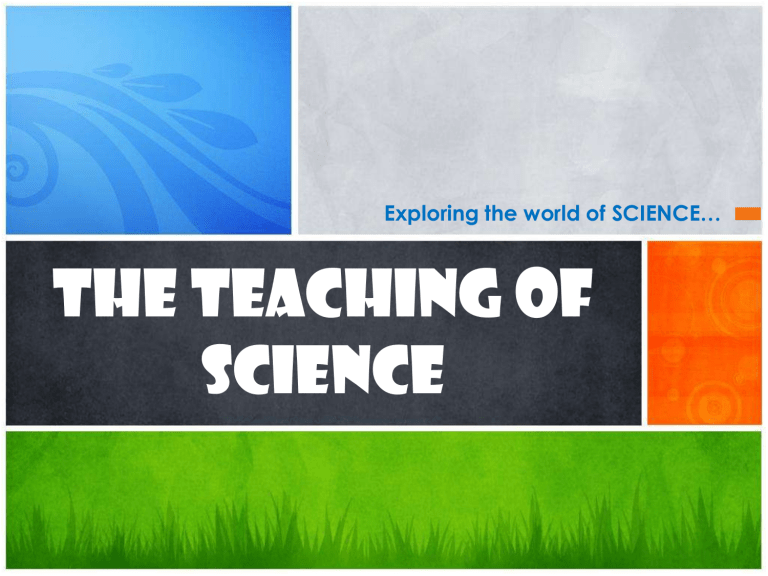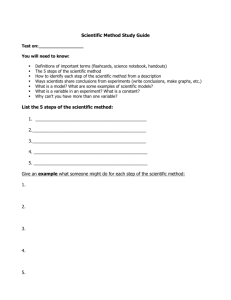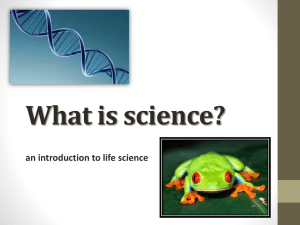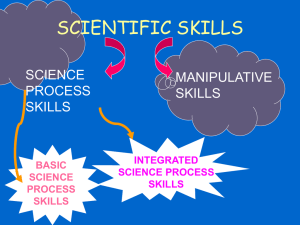
Exploring the world of SCIENCE… The TEACHING of SCIENCE The TEACHING of SCIENCE Science as a Subject The Science Processes Instructional Resources and Materials for Science Teaching “What is the most interesting subject in the school curriculum?” According to them, it is… SCIENCE SCIENCE as a SUBJECT SCIENCE is a required subject for basic education and as a specialization in higher education (DepEd) Nature of SCIENCE 1. Science is defined as organized knowledge, sometimes referred to as empirical knowledge. 2. Science is a field of systematic inquiry. 3. It is in itself a method, a technique and a system. 4. It is about nature and natural phenomena. Interest and appreciation for the “beautiful and the wonderful” are genuinely felt. 5. It deals with real objects and events. Authentic experiences are gained and learning is achieved through life-like learning exposures. 6. It demands perseverance, diligence and sacrifice. Interest in SCIENCE Science as a subject, deals with almost everything in the environment. The topics leave the students and even adults wonderstruck, stunned and awed. The instructional materials that can be used in teaching are abundant, rich and easily available. They are within reach. The principles and laws in science when applied enable us to come up with new and improved products and new ways of doing things. Equipped with scientific knowledge we become creative, that means, we are able to originate novel ways of doing things rather that follow out dated traditional ways and practice. Scientific knowledge and procedures make us competent in searching for new and better ways of explaining why and how events occur and exist in the environment and all over our earth. Science teaching keeps us abreast with discoveries and inventions, thus at pace with global trends and modernization. The SCIENCE Processes Developing the students’ competence in searching for knowledge and information INFERRING Infer means to state an idea which is based on observations. An inference is an interpretation or a tentative conclusion based on observations. Advantages in Developing the Skill 1. The skill can lead them into investigations following the scientific method. 2. Inferring can enhance their reasoning ability. 3. They will be motivated to gather more observations in order to form correct inferences. How to Develop the Skill 1. Provide more practice on inferring to sharpen their reasoning ability. 2. When asking for inferences, caution them in forming ideas only after gathering enough observations that were thoroughly analysed. 3. Problem solving that calls for tentative conclusions can develop the skill in the long run. Predicting It is the process of making a forecast based on observed events. The predictions made between observed data is called interpolation and one made beyond observed data is called extrapolation. Advantages in Developing the Skill 1. With the skill well-developed, students become more careful in making forecasts, otherwise they will turn out to be guesses. 2. Skill in predicting speaks of a scientific mind. 3. For as long as the forecast is based on reliable data, this is a guarantee that students will always be confident in following the scientific method. 4. Constant practice in predicting makes students stick to accurate measurements, data and other information. How to Develop the Skill 1. Record observations in the form of graphs or tabulations where students can see a trend or a pattern. 2. Provide experiences in making forecasts about events in the environment that are controlled by time, measuring equipment and price. 3. Emphasize that there may be several variables that can affect the predicted event; hence the prediction will not be accurate. 4. Caution them on making predictions beyond observed events because the same results cannot be guaranteed. Controlling Variables Variable is the factor or condition of the effect of which is being tested. The variables in an experiment are classified into three: Manipulated variable Constant variable Responding variable Advantages in Developing the Skill 1. The students become skilled in searching for reliable evidence before formulating a conclusion. 2. The training on how to design on experiment is developed. 3. Such a controlled set-up enables students to follow the scientific method. How to Develop the Skill 1. Before proceeding, identify clearly the variable to be changed. 2. Be strict with keeping the rest of the conditions the same. 3. Provide practice in this kind of activity. They will be trained in searching for cause-and-effects in some conditions in the environment. 4. How to arrive at correct conclusions must be the objective. Interpreting Data Data collected from a variable in an experiment should be analyzed thoroughly in order to arrive at a clear and reliable conclusion. Advantages in Developing the Skill 1. The students become skilled in determining relationship between variables, proficiency much-needed in interpreting results. 2. The exercise will sharpen their ability in observing and recording data in an orderly manner. 3. Proficiency in interpreting observations will be developed. How to Develop the Skill 1. Train them in presenting data through various illustrations such as colored graphs, circular diagrams to show percentages and tabulations . 2. Let them interpret different kinds of relationship in order to make them differentiate between relevant and irrelevant data. 3. An objective and unbiased interpretation form part of their study and work habits. Experimenting The skill in experimenting is the final test that requires competence in science processes especially controlling variables, interpreting data and formulating hypothesis. Advantages in Developing the Skill 1. A scientific mind that has cultivated a scientific methodology is definitely one the best goals of science teaching. 2. The skill in experimenting has a lasting effect on how they approach any learning activity, individually or in cooperation with co-experimenters. 3. It becomes easy for students to try to seek solutions or answers to everyday problems and questions . How to Develop the Skill 1. Making every learning activity problembased and solution-oriented is ideal in a science course. 2. The scientific methodology becomes perfected if the students experience success and is recognized. 3. Involve the students in planning and implementing the designed set-up. 4. Revision in some steps in the procedure may be allowed in order to enhance their creativity in finding appropriate answers to everyday inquiries. INSTRUCTIONAL RESOURCES and MATERIALS for SCIENCE TEACHING The TEACHING of SCIENCE Prepared by: Ms. Gizzelle A. Pangilinan



